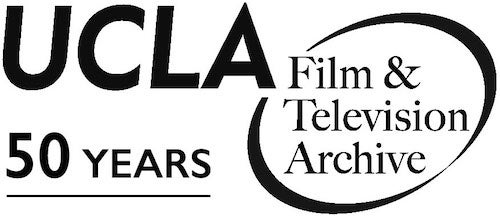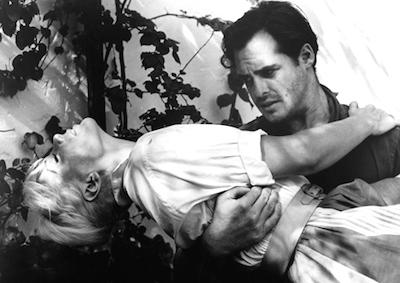Download the 2015 UCLA Festival of Preservation catalog PDF >
Read Los Angeles Times film critic Kenneth Turan's review >
From the Director
The year 2015 marks the 50th anniversary of UCLA Film & Television Archive and so we are doubly proud to put on our biennial UCLA Festival of Preservation to kick off a series of anniversary-related events that will run throughout the year. As director of UCLA Film & Television Archive, I’m happy to introduce the 17th iteration of our Festival, which again reflects the broad and deep efforts of the Archive to preserve and restore our national moving image heritage. And while the rest of the world has seemingly made the transition to a 100 percent digital environment, the Archive is still committed to preserving films on film, while we still can, even if our theater will increasingly be projecting digital material.
Our Festival opens with the restoration of Men in War (1957), directed by Anthony Mann, who made a name for himself at Universal directing adult westerns. This big budget war film, starring Robert Ryan and Aldo Ray, details the troubles experienced by a platoon of American soldiers, who are trapped behind enemy lines during the Korean War. Unlike Hollywood’s more heroic representations of World War II, Mann’s film presages the disconnect between officers and enlisted men that would become systemic during the Vietnam War. We close with another classic war film, John Ford’s The Long Voyage Home (1940), starring John Wayne and Thomas Mitchell as merchant seamen transporting ammunition to England for the European war effort against the Nazis. Between these bookends, this year’s UCLA Festival of Preservation offers something for everyone, whether one is interested in film or television, comedy, drama or documentary.
In the comedy department, we are proud to be able to present the latest results in our ongoing effort to preserve the legacy of Laurel & Hardy, including the shorts The Midnight Patrol (1933) and The Music Box (1932). We are also screening a new restoration of the comedy hit of last year’s Cinefest in Syracuse, Bachelor’s Affairs (1932), a pre-Code gem, starring Adolphe Menjou as a die-hard bachelor who is felled by a ditzy blonde bombshell. As is standard operating practice, given our close working relationship with the Film Noir Foundation, we have again restored a number of rare and interesting film noirs, including Too Late for Tears (1949), starring Lizabeth Scott in a career-defining role as a housewife whose life careens out of control. Director John Reinhardt’s low, low budget noir, The Guilty (1948), is based on a Cornell Woolrich story, while Woman on the Run (1950), another under-rated noir, stars Ann Sheridan as the wife of a man who has witnessed a murder. Finally, director Samuel Fuller’s Dead Pigeon on Beethoven Street (1972) is not exactly a noir, but a crime drama produced for German television, and it constitutes the Archive’s first complete digital restoration.
An area of increasing interest for the Archive is exploitation films, which have been for the most part ignored by film historians, even though such films were hugely popular at the time of their release. Our head of preservation, Scott MacQueen, has taken the lead in restoring the Archive’s exploitation holdings, so we are proud to present a number of truly weird and wild films from the early 1930s: White Zombie (1932) features Bela Lugosi in the aftermath of Dracula (1931) in a horror film that has become a cult classic; Ouanga (1935) reprises White Zombie’s Haitian setting for a tale of voodoo and miscegenation, starring the tragic African American actress, Fredi Washington, who could have had a huge career if she had not refused to “pass” for white. Based on Edgar Allen Poe’s “The Premature Burial,” The Crime of Dr. Crespi (1935) stars the great Erich von Stroheim after his fall from grace in Hollywood. Finally, Leslie Stevens’ directorial debut, Private Property (1960), is another rare find, the film straddling both the exploitation and art house markets.
In the past two years, the Archive has stepped up its efforts under television archivist Dan Einstein to preserve classic television. We begin with The Execution of Private Slovik (1974), one of the most celebrated made-for-television movies of the 1970s, and an episode of Chevy Mystery Theatre (NBC, 7/31/60), both programs penned by the writing team of Richard Levinson and William Link. Another program includes a classic episode from Playhouse 90, a popular omnibus show from the late 1950s, which visualizes a nuclear holocaust for American viewers.
The Archive’s efforts to restore the work of independent filmmakers are represented by two long-neglected masterpieces, director Stanton Kaye’s brilliant road movie, Brandy in the Wilderness (1969), and J.L. Anderson’s Spring Night, Summer Night (1967), an amazingly realistic film from rural Appalachia. We also continue our efforts to preserve and protect the legacy of the “L.A. Rebellion,” with a program of shorts by African American women, including a new restoration of filmmaker Julie Dash’s Illusions (1982), which finally corrects deficits on the soundtrack that had been present since the film’s premiere.
Last, but not least, our newsreel preservation team of Blaine Bartell and Jeffrey Bickel present two programs from our Hearst Metrotone News Collection, including one night dedicated to the Arab-Israeli conflict, and another celebrating the 50th anniversary of the Voting Rights Act of 1965, a milestone in the Civil Rights Movement.
As is always the case, the Archive’s internationally recognized preservationists will appear in person at many Festival screenings to introduce the films and discuss their work with audiences. All of our restoration work and public programs—including this Festival—are funded by donations from individuals, foundations, corporations and government agencies. We are most thankful for the generosity of these organizations and individuals.
Dr. Jan-Christopher Horak
Director, UCLA Film & Television Archive







 Mobile Navigation
Mobile Navigation


























